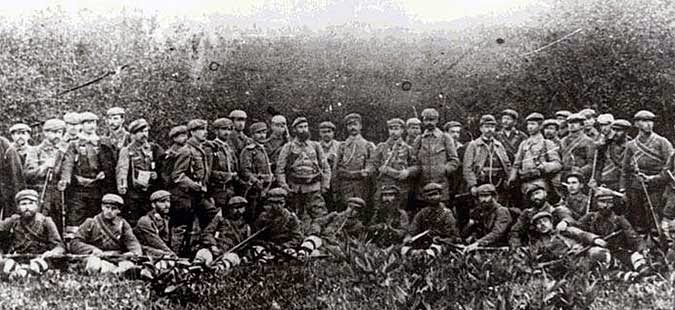Makedonec do Koska
Ultra-Poster
[h=3]Macedonia prepares to mark a century since the killing of Jane Sandanski [/h]Labels: 19.-20. Jhdt., Geschichte, Komiti, Pirin Makedonien
Macedonia marks the centennial since the death of Jane Sandanski, a leading military commander of the VMRO and legendary fighter for Macedonian independence from the Ottoman Empire. Nicknamed the Tsar of Pirin, for the mountain where he was born in 1872, and killed in 1915, Sandanski was a VMRO commander for the region of Pirin and the near by region of Serres.
Born in the village of Vlahi, near the city of Sveti Vrac, which is now named Sandanski, in honor of the hero, Sandanski was only 5 when the family had to flee to the regional center of Gorna Dzumaja (now Blagoevgrad) from the fighting caused by the Russian Turkish war. Once the war settled and the defeated Ottoman Empire was never the less allowed to keep Macedonia, this sparked the Kresna uprising, centered in the Pirin region. Ivan Sandanski, Jane's father, was one of the flagbearers of a militia involved in the uprising. Once they were defeated by the Turkish Army, the Sandanskis moved to Dupnica where the family lived in misery, among many refugees from the fighting. Jane grew up in Dupnica, finished two grades of high school, apprenticed for a shoemaker and in his uncle's law office.
While in high school, he begins reading revolutionary literature and becomes dedicated to the idea of continuing his father's struggle. Speaking with the Bulgarian philologist Ljubomir Miletic, who wrote his biography, Sandanski said that even as a child, whenever the kids would play war, he would always take the role of the Macedonian komiti the fighters of the liberation committees.
Between 1892 and 1894, Sandanski joined the Bulgarian army, which was an immensely valuable experience for him. Two years later he begins to connect with the revolutionary movements in Macedonia, which remained wholly under Ottoman rule, even though the Turkish Empire was clearly fragmenting and collapsing. In 1897, Sandanski formed the Mladost (Youth) cultural organization, and after getting in touch with the Dupnica teacher and revolutionary Dimo Hadzi Dimov, and especially after meeting the VMRO leader Goce Delcev, Sandanski decides to join the Internal Macedonian Revolutionary Organization. Delcev, and his ideas for an independent Macedonia, become the main inspiration and ideal for Sandanski.
ARTIKEL WEITER LESEN >>>>
Macedonia marks the centennial since the death of Jane Sandanski, a leading military commander of the VMRO and legendary fighter for Macedonian independence from the Ottoman Empire. Nicknamed the Tsar of Pirin, for the mountain where he was born in 1872, and killed in 1915, Sandanski was a VMRO commander for the region of Pirin and the near by region of Serres.
Born in the village of Vlahi, near the city of Sveti Vrac, which is now named Sandanski, in honor of the hero, Sandanski was only 5 when the family had to flee to the regional center of Gorna Dzumaja (now Blagoevgrad) from the fighting caused by the Russian Turkish war. Once the war settled and the defeated Ottoman Empire was never the less allowed to keep Macedonia, this sparked the Kresna uprising, centered in the Pirin region. Ivan Sandanski, Jane's father, was one of the flagbearers of a militia involved in the uprising. Once they were defeated by the Turkish Army, the Sandanskis moved to Dupnica where the family lived in misery, among many refugees from the fighting. Jane grew up in Dupnica, finished two grades of high school, apprenticed for a shoemaker and in his uncle's law office.
While in high school, he begins reading revolutionary literature and becomes dedicated to the idea of continuing his father's struggle. Speaking with the Bulgarian philologist Ljubomir Miletic, who wrote his biography, Sandanski said that even as a child, whenever the kids would play war, he would always take the role of the Macedonian komiti the fighters of the liberation committees.
Between 1892 and 1894, Sandanski joined the Bulgarian army, which was an immensely valuable experience for him. Two years later he begins to connect with the revolutionary movements in Macedonia, which remained wholly under Ottoman rule, even though the Turkish Empire was clearly fragmenting and collapsing. In 1897, Sandanski formed the Mladost (Youth) cultural organization, and after getting in touch with the Dupnica teacher and revolutionary Dimo Hadzi Dimov, and especially after meeting the VMRO leader Goce Delcev, Sandanski decides to join the Internal Macedonian Revolutionary Organization. Delcev, and his ideas for an independent Macedonia, become the main inspiration and ideal for Sandanski.
ARTIKEL WEITER LESEN >>>>





